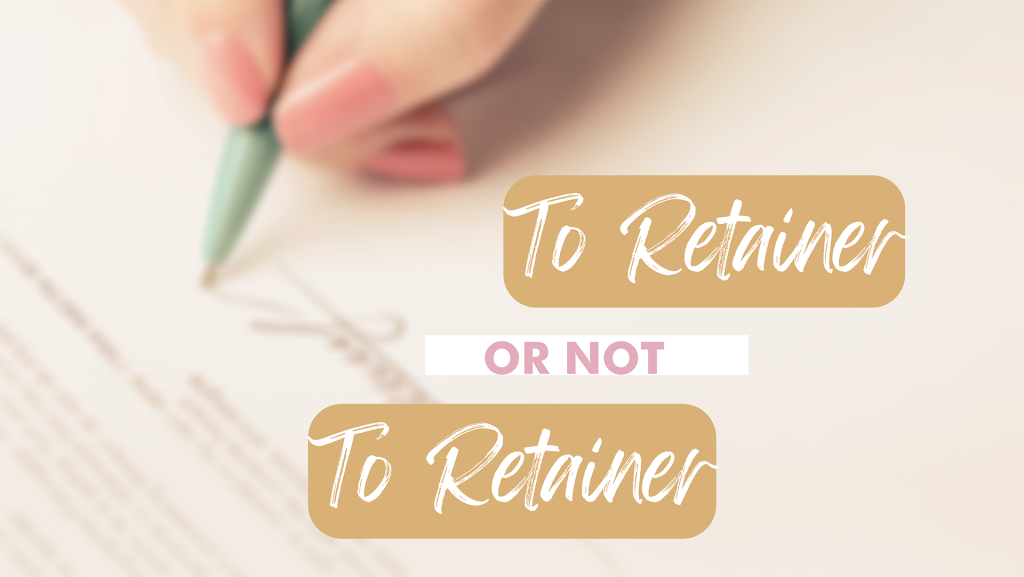If you’ve worked with freelancers before, you’ve probably had the experience of them going MIA halfway through a project (or at least heard horror stories from friends). There’s also that situation when you need them again post-project, and they’re nowhere to be found. Even worse, they might respond, but they’re booked out months in advance, so you’re stuck waiting.
Those experiences can make you hesitant to work with freelancers again. But what if there was a way to avoid all of that? Enter the retainer agreement. This is what I want to talk about today – whether or not you should use a retainer agreement when working with freelancers.
What Is a Retainer Agreement?
A retainer agreement is simply a contract between you and the freelancer where you agree to pay them a certain amount per month in exchange for a set number of hours of work (or a certain amount of work, if it’s a project-based retainer). It’s a way of establishing an ongoing working relationship with a freelancer rather than just working with them on a project-by-project basis.
For example, let’s say you have a blog that you update weekly. You could hire a freelance writer on a retainer basis to write 4 blog posts per month. This would give you the security of knowing that those blog posts will be taken care of, and you wouldn’t have to worry about finding a new freelancer every time you need one.
How Is a Retainer Agreement Different From a Traditional Contract?
The main difference between a retainer agreement and a traditional contract is that with a retainer, you’re paying for the freelancer’s time in advance. This means they’re essentially “on call” for you during that time period and are obligated to do work for you if you need it.
With a traditional contract, on the other hand, you’re only paying for the work that’s actually being done. So if you need additional work outside of what was originally agreed upon, you would have to negotiate a new contract (or at least an amendment to the existing contract) and pay for that work separately.
For instance, let’s say you have a sales page you need written before launch. You could hire a freelance copywriter on a traditional contract basis to write the sales page for you. Once the page is written and approved, the contract is complete, and you would only pay for the work that was done. A month later, if you need to change the sales page or add something new, you would need to hire the copywriter again and negotiate a new contract.
Alternatively, you could hire the same copywriter on a retainer basis. This means you’d pay them monthly (or however often you agree upon) in exchange for a certain number of work hours. So if you need to make changes to the sales page a month later, you would already have an agreement in place and wouldn’t need to negotiate a new contract.
The Pros and Cons of Working With a Retainer
So, should you use a retainer agreement when working with freelancers? Let’s take a look at some of the pros and cons.
Pros:
Let’s start with the positive aspects of working with a retainer.
You Have a Reliable Freelancer on Call
If you have a freelancer you love working with, it can make a lot of sense to lock them down with a retainer agreement. After all, you want to make sure they’re available when you need them, right? That’s especially true if you have an ongoing need for their services (like the weekly blog example I mentioned earlier).
That way, you don’t have to keep going through the hassle and expense of finding new freelancers every time you need something done. You know that your go-to person is always just a quick email or phone call away.
You Can Get a Discounted Rate
Another advantage of working with a retainer agreement is that you can often get a discounted rate. This is because the freelancer knows they have a guaranteed stream of income coming in from you, so they’re more likely to give you a break on their rates. That means you’ll save money in the long run.
You’ll Have Someone Who “Gets” It
Sometimes, the issue with hiring freelancers is the hassle that comes with having to explain your business and goals to someone new every time you need something done. But if you have a freelancer on retainer, they’ll already know your business inside and out.
That means they can hit the ground running without needing a lot of direction from you. And it also means they’re more likely to produce work that’s in line with your goals and objectives. No need to keep starting from scratch every time you need something done!
You Can Avoid Deadlines and Rush Jobs
Last but not least, one of the best things about having a freelancer on retainer is avoiding those last-minute rush jobs.
We’ve all been there… you suddenly realize you need something done, and you need it done yesterday. So you start scrambling to find a freelancer who can do the job on such short notice. But if you have someone on retainer, you can simply send them an email (or give them a call), and they’ll get right to work. No need to panic!
Cons:
Of course, working with a retainer agreement also has some potential downsides. Let’s take a look at a few of those now.
You Might Pay for Time You Don’t Use
One potential downside is that you might end up paying for time you don’t actually use. For instance, let’s say you have a freelancer on retainer for 10 hours per month. But one month, you only need them for 5 hours of work. The other 5 hours go unused. In that case, you’re essentially paying for the time you didn’t use.
It’s a risk you have to be willing to take when you sign a retainer agreement. But as long as you’re realistic about how much work you’ll actually need done, it shouldn’t be an issue.
You Might Feel Like You’re “Locked In”
Another potential downside is that you might feel like you’re “locked in” to working with a particular freelancer. And if you’re not happy with their work, it can be hard to break free from the agreement, especially if there are notice requirements or other contract terms to consider.
Of course, this is why it’s so important to make sure you’re happy with the freelancer before you sign an agreement. Test them out for a couple of weeks or months first to make sure they’re a good fit for your needs. That way, you won’t be stuck in a situation where you’re unhappy with their work.
The Agreement Might Not Be as Flexible as You’d Like
Finally, it’s worth mentioning that retainer agreements might not be as flexible as you’d like. For instance, if your needs suddenly change and you need more work done than what’s specified in the agreement, you might be out of luck. The freelancer might not be able to (or be willing to) accommodate your needs.
So it’s important to have a bit of flexibility built into the agreement. That way, if your needs do change, you won’t be left high and dry.
When Should You Use a Retainer Agreement?
Now that we’ve gone over the pros and cons of retainer agreements, you might be wondering when (or if) you should use one. Here are a few scenarios where a retainer agreement would make sense:
1. If You Need Regular, Ongoing Work Done
If you need regular, ongoing work done, then a retainer agreement would make sense. For instance, if you need someone to manage your social media accounts or create weekly blog posts, a retainer agreement would be a good way to ensure that you have the help you need on a regular basis.
2. If You Have Recurring Projects
Another scenario where a retainer agreement would make sense is if you have recurring projects. For instance, let’s say you need help with your website’s service pages every couple of months. In that case, you could sign a retainer agreement for a certain number of hours per month (or per project). That way, you wouldn’t have to worry about finding a freelancer every time you need work done.
3. If You Don’t Have the Time (or Inclination) to Find New Freelancers Every Time You Need Work Done
Sometimes, it isn’t about the work itself. It’s about the time and effort it takes to find a new freelancer every time you need work done. If that’s the case, then a retainer agreement would make sense. Having someone on retainer means you don’t have to go through the hassle of finding a new freelancer every time you need work done.
4. If You Finally Found a Freelancer You Love and Want to Keep Them Around
This scenario might not happen often, but it does happen. Sometimes, you finally find that perfect freelancer who just “gets” your business and your needs. If that’s the case, you might want to sign a retainer agreement so you can keep them around for the long haul. These types of freelancers are hard to come by, so it’s worth holding onto them if you can.
5. If Your Favorite Freelancer is Always Fully Booked
Lastly, if your favorite freelancer is always fully booked and you can’t seem to get them to take on your projects, a retainer agreement might be the answer. When you have a freelancer on retainer, they’re essentially reserved for your projects, so you don’t have to worry about them being unavailable when you need them.
The Final Verdict
So, should you use a retainer agreement? It depends on your particular situation. It ultimately boils down to the amount and type of work you need done, the frequency of the work, whether you have a good working relationship with the freelancer, and whether you feel comfortable with the agreement.
With writing, a retainer is often a good way to get a bulk discount, regular content, and first dibs on the freelancer’s time. Not to mention, consistency in tone of voice, style, and quality is essential, and a retainer can help ensure that instead of a hodgepodge of different writers, you have one or two that you know and trust.
If you decide a retainer is the way to go for your business, be sure to put together a solid agreement that outlines the scope of work, deliverables, deadlines, and payment terms. That way, there are no surprises down the road for either you or the freelancer. And, as always, make sure to do your research and only work with freelancers you trust.
Fun fact: 99.9% of my work is done on a retainer basis! Maybe you’ll be my next client! Contact me if you have any copywriting or content writing needs.



